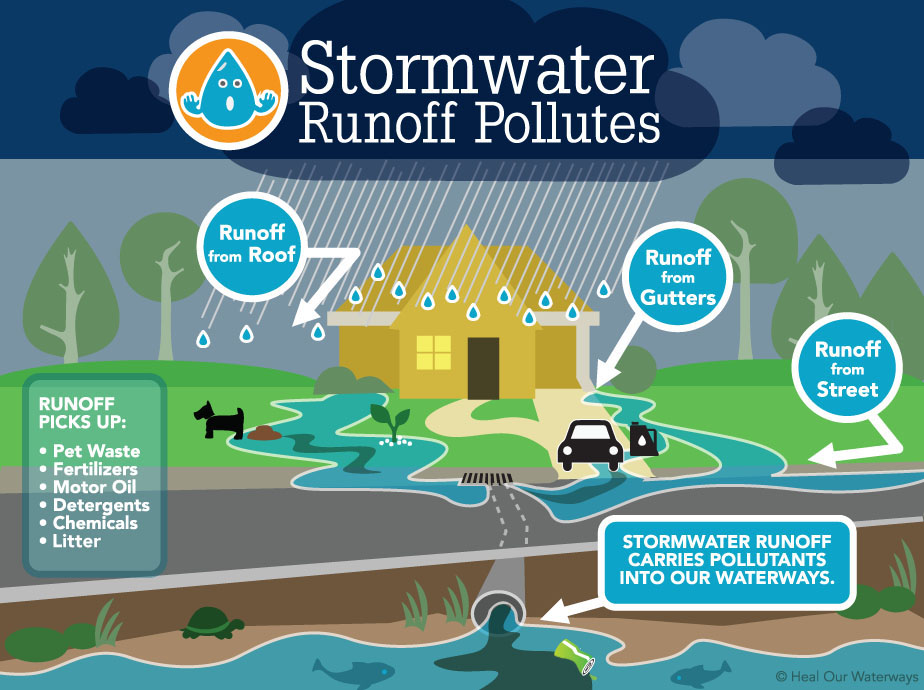What is Stormwater Pollution?
What is Stormwater?

Stormwater is the flow of water that results from precipitation which occurs immediately following rainfall or as a result of snowmelt. When a rainfall event occurs, several things can happen to the precipitation. Some of the precipitation infiltrates into the soil surface, some is taken up by plants, and some is evaporated into the atmosphere. Stormwater is the rest of the precipitation that runs off land surfaces and impervious areas.
What is stormwater and how is it managed in Milford?
Stormwater is the flow of water that results from precipitation which occurs immediately following rainfall or as a result of snowmelt. Impervious surfaces, such as rooftops, driveways, and parking lots create the most runoff because the water cannot penetrate into the ground. The system is a network of catch basins, yard inlets, and pipes which keep water from flooding roads and property. Eventually the stormwater flows to the Town’s streams, brooks, ponds and the Souhegan River. Milford’s stormwater management program is responsible for the maintenance and improvement of these drainage systems.
The Effects of Stormwater Pollution
- Polluted stormwater runoff can have many adverse effects on plants, fish, animals and people.
- Sediment can cloud the water and make it difficult or impossible for aquatic plants to grow. Sediment also can destroy aquatic habitats.
- Excess nutrients can cause algae blooms. When algae die, they sink to the bottom and decompose in a process that removes oxygen from the water. Fish and other aquatic organisms can't exist in water with low dissolved oxygen levels.
- Bacteria and other pathogens can wash into swimming areas and create health hazards, often making beach closures necessary.
- Debris (such as plastic bags, six-pack rings, bottles, cigarette butts) washed into waterbodies can choke, suffocate, or disable aquatic life, like ducks, fish, turtles and birds.
- Household hazardous wastes, like insecticides, pesticides, paint, solvents, used motor oil and other auto fluids, can poison aquatic life. Land animals and people can become sick or die from eating diseased fish and shellfish or ingesting polluted water. Managing Household Chemicals
- Polluted stormwater often affects drinking water sources, affecting human health.
- Stormwater runoff contributes to over 90% of the water quality problems in New Hampshire.
In order to position Milford for a strong future and protect our water resources, additional effort is needed to address these issues.
How do we solve these problems?
The Town has developed a list of activities that incorporate best management practices (BMPs) to begin solving these problems. This is based on an understanding of the current drainage system and new regulatory requirements. In general, these BMPs include:
- Public education and involvement activities
- Pollution prevention practices for residential, business and municipal properties
- Increased street sweeping and cleaning of catch basins
- Increased rehabilitation of deteriorated drainage structures
- Retrofitting of existing drainage systems to improve water quality
- Enforcement of construction site stormwater management practices and stormwater design standards
- Developing engineering designs for stormwater treatment structures
Regulatory Requirements
The Town of Milford has an existing stormwater permit from the U.S. Environmental Protection Agency (EPA), known as the Municipal Separate Storm Sewer System (MS4) Permit. The Town reports its stormwater activities to EPA every year and these reports are publicly available for all regulated cities and towns. EPA re-issued the MS4 Permit in January 18, 2017 and it contains new requirements that the Town must meet over the next several years. The goal of the MS4 Permit is to improve water quality through more robust stormwater management activities, such as those outlined above. On July 1, 2018, the MS4 permit went into effect and efforts have been underway to ensure the Town’s stormwater management program meets the new permit requirements. See Final 2017 New Hampshire Small MS4 General Permit (PDF).

